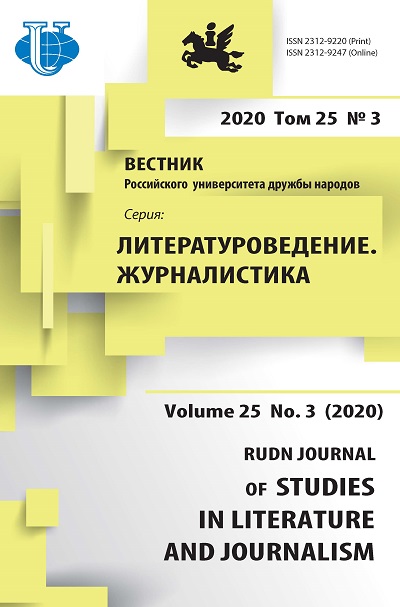Художественные искания поэтов дальневосточного зарубежья: версификационная поэтика Лариссы Андерсен
- Авторы: Цмыкал О.Е.1
-
Учреждения:
- Амурский государственный университет
- Выпуск: Том 25, № 3 (2020)
- Страницы: 447-457
- Раздел: Литературоведение
- URL: https://journals.rudn.ru/literary-criticism/article/view/24821
- DOI: https://doi.org/10.22363/2312-9220-2020-25-3-447-457
- ID: 24821
Цитировать
Полный текст
Аннотация
Статья посвящена анализу версификационных особенностей лирики поэтессы дальневосточного зарубежья Лариссы Андерсен в контексте литературного процесса дальневосточной ветви русской эмиграции. Новизна исследования определяется тем, что версификационная поэтика ее творчества впервые становится предметом самостоятельного и системного изучения. Объектом изучения выступает лирика Л. Андерсен дальневосточного периода (1920-1940-е гг.). Целью является целостное исследование версификационной поэтики Л. Андерсен 1920-1940-х гг. на материале харбинских публикаций, авторского сборника «По земным лугам» (1942) и коллективного сборника «Остров» (1946). Показано, что техническая, формальная сторона стиха не является для Лариссы Андерсен самоцелью или доминантой, что отражает общую непосредственность лирики поэтессы. Однако если того требует концепция произведения, Андерсен прибегает к необычным для себя версификационным средствам (поиски в области метра, рифмы и ритма). Не чужды Лариссе Андерсен и смелые эксперименты, вследствие которых рождаются стихи, перекликающиеся с детской поэзией, народным стихом, китайской классической поэзией, лирикой футуристов и т. д.
Об авторах
Ольга Евгеньевна Цмыкал
Амурский государственный университет
Автор, ответственный за переписку.
Email: sciencia@yandex.ru
магистр филологии, ассистент кафедры литературы и мировой художественной культуры
Российская Федерация, 675000, Благовещенск, Игнатьевское шоссе, 21Список литературы
- Забияко А.А. Тропа судьбы Алексея Ачаира. Благовещенск, 2005. 275 c.
- Забияко А.А., Эфендиева Г.В. «Четверть века беженской судьбы…» (Художественный мир лирики русского Харбина): монография. Благовещенск: Изд-во АмГУ, 2008. 428 с.
- Забияко А.А. Лирика «харбинской ноты»: культурное пространство, художественные концепты, версификационная поэтика: автореф. дис. … д-ра филол. наук. М.: Изд-во МПГУ, 2007.
- Кузнецова О.Ф. «Лучшие песни мои со мной…». Из писем Лариссы Андерсен Валерию Перелешину // Звезда. 2011. № 11. URL: https://zvezdaspb.ru/index.php?page= 8&nput=1732 (дата обращения: 15.12.2019).
- Эфендиева Г.В., Поливан Р.В. Стиховые доминанты в лирике Лариссы Андерсен // Русский Харбин, запечатленный в слове. 2010. Вып. 4. С. 126-142.
- Андерсен Л. По земным лугам: стихи. Шанхай: Изд-во журнала «Современная женщина», 1940. 56 c.
- Остров: сборник стихотворений. Шанхай, 1946. 292 c.
- Семеро: сборник стихов. Харбин: ХСМА, 1931. 74 с.
- Рубеж. Харбин, 1939. № 20. С. 8.
- Солодкая М.Б. Л.Н. Андерсен «В погаснувшем прошедшее воскресло»: письма к Л. Хаиндровой // Культурная жизнь Юга России. 2012. № 1 (44). С. 54-59.
- Рубеж. Харбин, 1933. № 22. С. 10.
- Гаспаров М.Л. Очерк истории русского стиха. М., 2000. 351 с.
- Гаспаров М.Л. Семантический ореол пушкинского четырехстопного хорея // Пушкинские чтения: сб. ст. / сост. С.Г. Исаков. Таллин, 1990. С. 5-14.
- Лойтер С.М. Поэтика детского стиха в ее отношении к детскому фольклору. Петрозаводск: Изд-во ПетрГУ, 2005. 216 c.
- Андерсен Л.Н. Одна на мосту: стихотворения, воспоминания, письма / сост., вступ. ст. и примеч. Т.Н. Калиберовой. М.: Русский путь; Библиотека-фонд «Русское зарубежье», 2006. 524 с.
Дополнительные файлы















